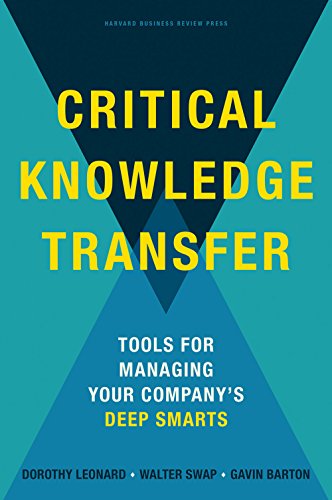Critical Knowledge Transfer: Tools for Managing Your Company’s Deep Smarts Link to heading
Summary Link to heading
“Critical Knowledge Transfer: Tools for Managing Your Company’s Deep Smarts” is a comprehensive guide that focuses on the crucial process of transferring essential tacit knowledge within organizations. Written by Walter C. Swap, Dorothy Leonard, and Gavin Barton, the book addresses the often-overlooked challenge of ensuring continuity and avoiding knowledge loss as experienced employees retire or move on. It explores methods and tools for identifying, capturing, and distributing what the authors call “deep smarts”—the intuitive and experience-based knowledge that is vital for organizational success. By leveraging case studies and practical insights, the authors provide strategies for effective knowledge transfer that can help organizations maintain competitive edge and foster innovation.
Review Link to heading
The book is widely regarded for its practical approach and its focus on a critical aspect of talent management and organizational health. One of its major strengths is the clear presentation of strategies accompanied by real-world examples, which make the concepts accessible and actionable for business leaders. The authors, with their extensive backgrounds in psychology and management, lend credibility and depth to the discussion. However, some readers may find the content somewhat repetitive in places, and the emphasis on larger corporations might not fully apply to smaller businesses or start-ups. Overall, the book is considered a valuable resource for those interested in sustaining knowledge within an organization.
Key Takeaways Link to heading
- Identifying Deep Smarts: Learn to recognize critical tacit knowledge within your organization that is vital for success.
- Capture and Documentation Techniques: Practical tools and techniques for effectively capturing and documenting essential knowledge.
- Facilitating Knowledge Transfer: Strategies to facilitate the smooth transfer of knowledge through mentorship, storytelling, and job rotation.
- Overcoming Barriers: Understanding and addressing the human and organizational barriers to effective knowledge transfer.
- Customizing Approaches: The importance of tailoring knowledge management strategies to the specific context and culture of the organization.
Recommendation Link to heading
“Critical Knowledge Transfer” is highly recommended for business leaders, HR professionals, and knowledge management specialists seeking to mitigate the risks associated with knowledge loss in their organizations. It is particularly useful for those in industries where specialized, experience-based knowledge is key to performance and innovation. The book offers valuable insights to anyone responsible for succession planning and organizational development.
